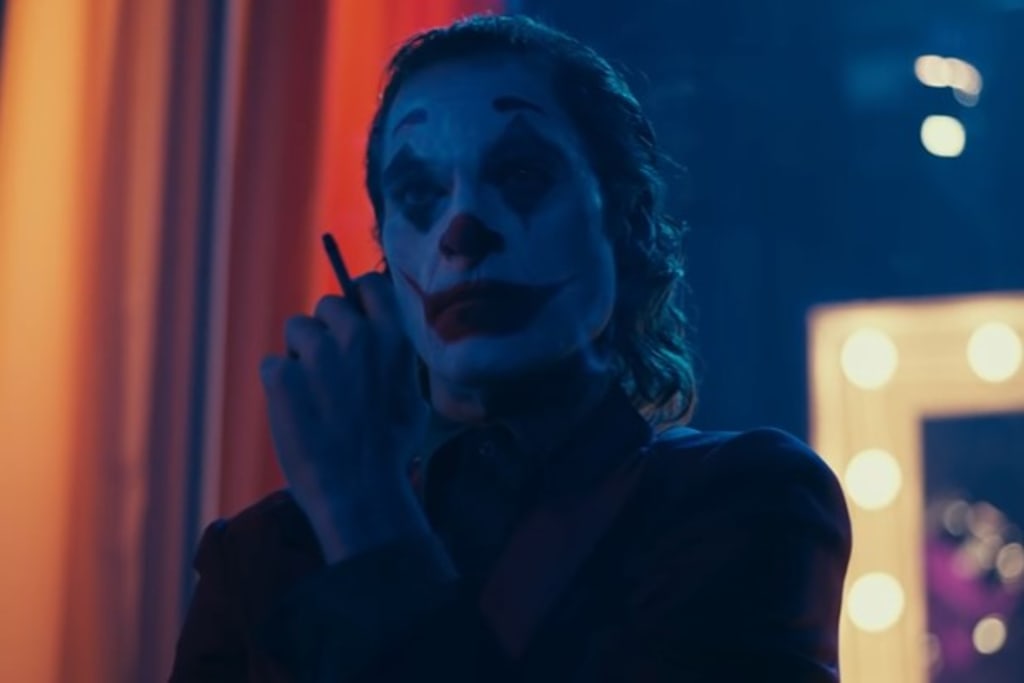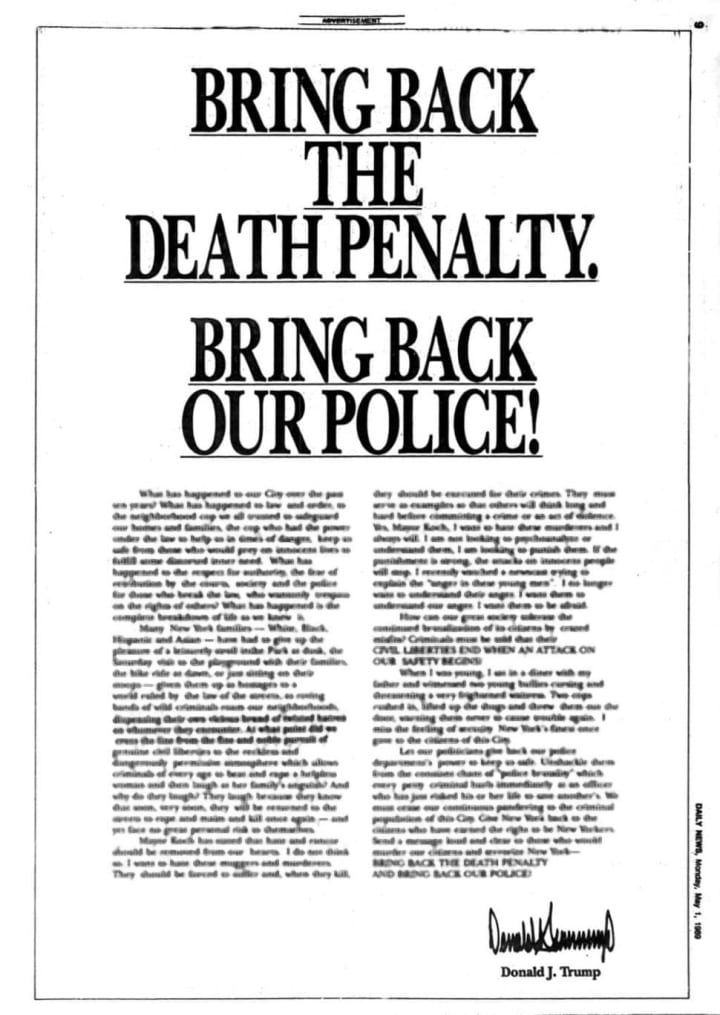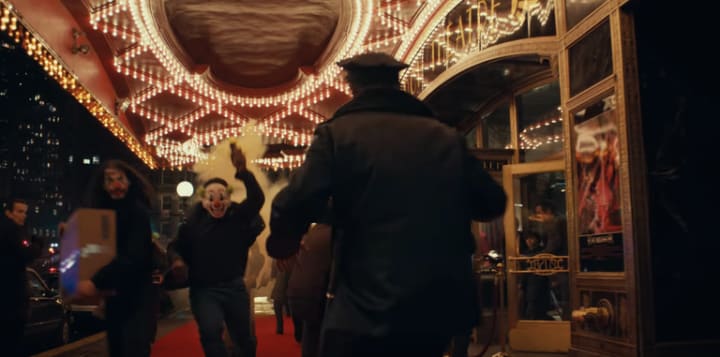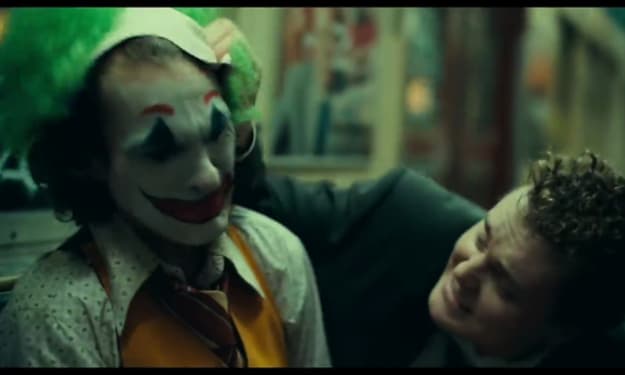Joker - A Victim of The Reagan Revolution
Historically Contextualizing Arthur Fleck

The film opens on October 13 1981, according to the radio. Two months prior to this, President Reagan's budget is passed and signed into law. Later on in the film, the social worker gives Arthur Fleck the bad news...
'They cut our funding. They’re closing down our offices next week. The city’s cut funding across the board, social services is part of that.'
By this point in the film some time has passed. However, although Reagan's budget was passed in August, the budget cuts do not begin until October 1st, close to when the film picks up. President Reagan comes into office in January of 1981. The Gipper is the presidential embodiment of modern day American conservatism, his ideas at the time were revolutionary. Sadly, Arthur Fleck becomes the Joker due to President Reagan's policies and new political realignment at the time.
In The Beginning
During his first appointment in the film, Arthur Fleck notes "Is it just me, or is it getting crazier out there?" His question to the therapist is found in some reason. His therapist replies "It is certainly tense. People are upset, they’re struggling, looking for work. These are tough times." President Reagan inherits a 7.5% unemployment rate. When the film begins, unemployment is up to 7.9%, therefore nothing is getting better over night. Inflation is near 12% and down to only 11% in October. Wages have remained stagnant since 1973. Economics aside, crime was on the run since the 1970s. Both the homicide rate and total property crime rate were at an all time high. We are still coming out of the seventies where we had Watergate, the loss of Vietnam, the rise of famous killers like Charles Manson and Ted Bundy. Americans had lost their innocence. Therefore, yes, things are only getting crazier, people are tense and so is Gotham.
The Rise of Reagan
Again, major socioeconomic changes do not come over night. Our government had been trying to curb this downturn in American life for quite some time, but to no avail and to no increase in morale either. Reagan changes all of that though. He came to the presidency in his inaugural address stating...
"Can we solve the problems confronting us? Well, the answer is an unequivocal and emphatic ''yes.'' […]And after all, why shouldn't we believe that? We are Americans."
Politics aside, Reagan was a great speaker, jovial and a people person. He made you feel good and that there was hope in the future. This flew in the face of his rather shaming, dreary predecessor, Jimmy Carter. Good days are here again, right? Inflation will be curbed, morality will return and America will be defeated by our newly elected government. Unfortunately, this is not the case. President Reagan states...
"In this present crisis, government is not the solution to our problem; government is the problem. From time to time we've been tempted to believe that society has become too complex to be managed by self-rule, that government by an elite group is superior to government for, by, and of the people."
Today, Reagan's antigovernmental outlook is the norm for many Republicans and American conservatives, one could dare say it is the mainstream thought now. In 1981, this was still something rebellious and populist among political thinkers. We went through The New Deal and The Great Society. Americans turned to the government in their times of need for any new threat to their lives. Here comes Reagan who says that is all over. We see it clear in his policy and positions. We begin a trend towards laissez-faire economics and supply-side theory. In general, the government is not good at spending your money for social services like health-care for example. Instead, the free market and capitalism is better equipped to handle many facets of the American life, not the state. Through this line of thought we strike through government spending and regulations. Moving forward, you, the private American citizen, knows best what to do with your money, not the government!
The Budget Cuts
President Carter signed the Mental Health Systems Act of 1980, which funded mental health care and mental health support systems. Nearly a quarter of mental health-care will be funded by federal spending. In fact, 2.5 million Americans receive metal-health treatment and psychotherapy. 750 local centers receive $357 million in U.S. funding to treat these patients. Sadly, half of these 2.5 million patients are making $5,000 or less at the time. When you adjust this for inflation, they are making little more than $14,000 a year. A full-time minimum wage job barely makes that much right now.
Once President Reagan comes to the Oval Office the budget is his first priority. Hot on the chopping block is Carter's mental health funding. It is believed in his economic pedagogy that cutting federal spending will curb inflation in the economy. The President will cut federal funding for social and welfare services by roughly 25-30%. Most federal funding will turn into block grants given to the states. Reagan feels the states will nd better than the federal government in spending this money. He also derives from that notion that the private market is better at running the show, rather than the government. Reagan does get what he wants too. States end up turning people with severe mental illness to large, underfunded, non-nursing homes. These very facilities were privately owned and ran for profit, which would mean they too would cut costs any way they could in the name of profits. Arthur Fleck may not live in any home, save for his stint before in Arkham State, we can see through these cuts and their effects, that people like Arthur Fleck are not a priority. The social worker puts it best...
"They don’t give a shit about people like you, Arthur. And they really don’t give a shit about people like me either."
The Rise of The Rich
Prior to the 1980s the last time the rich were upheld or at least famous figures was the Gilded Age with figures like Rockefeller. You have people who are celebrities in the eighties, like Donald Trump and Leona Helmsley, who are famous because they are rich, nothing else. We see the exact same thing with Thomas Wayne. Most audiences and fans know who Thomas Wayne is, but let's leave that out. Take this film on its own, you know nothing about Thomas Wayne and that he is wealthy and plans a run for Mayor of Gotham City.
Thomas Wayne calls the less fortunate clowns for not being able to make anything of themselves. He notices a anti-rich sentiment brewing in Gotham City. From this time on, the outlook from many people is that you are poor because you are lazy and unmotivated. Yet, the Reagan Revolution is the beginning of all of this. From Reagan and then on we have an ever increasing gap between the rich and poor. Understand, President Reagan did not raise the minimum wage to address the recession he inherits. During his tenure, the minimum wage was only $3.35. In today's dollars, this is less than $10 an hour, hence, still short of a living wage. Tie this to inflation and cuts in social services and welfare, how could someone like Arthur Fleck climb up and make something of himself.
Later on Thomas Wayne speaks about his run for mayor, in how he wants to help people.
"Well, what I will say is, there’s something wrong with those people. I’m here to help them. I want to lift them out of poverty, help make their lives better. That is why I’m running. They may not realize it, but I’m their only hope."
Unfortunately this comes off as pandering and snobbish. Thomas Wayne is basically saying he knows better than these people. Wayne will become mayor, the government in a sense and then be able to run these people's lives better than they do. Yet, this flies in the face of what the Reagan Revolution is based off of. Aside from that, the working class of Gotham is asking for help, but not his help.
I would dare compare Thomas Wayne to Donald Trump, but not President Trump. I am speaking of Donald Trump the real-estate magnate in 1989. The Central Park jogger case was well known at the time, this involved a case of a young white woman raped in Central Park in the summer of 1989. Five young black males were wrongfully accused for this crime. Trump took out ads arguing to bring the death penalty back in the four major newspapers.

Trump argued "...hate and rancor should be removed from our hearts. I do not think so. I want to hate these muggers and murderers. They should be forced to suffer …" Already this case was huge, put became larger due to Trump. Defendant Yusef Salaam, the five defendants' lawyers and defense counsel William Warren wrote in 2016 that Trump's narrative and usurpation of the public turned the jury and everyone against these five children. The same goes for Arthur Fleck as he even notes on Murray's show. All because the rich and famous Thomas Wayne said this was a big deal, it is now a big deal to the denizens of Gotham City.
We can also see this with Murray Franklin. Here we have a famous and most likely wealthy T.V. late night comedian. Arthur gets to him by trying to point out that Murray is far too removed from the masses of working class people and what they live through. Sure, Murray still lives in Gotham City and may not be part of the old money class. However, his success leads him to identify with the more elite class, rather than regular working class Gotham citizens. Let us not forget his closing song, That's Life, which is the motto of people. You cannot pay the rent? You are behind on medical bills? Well, sorry...that's life! Life is unfair, get over it, it is no one's job, especially the government's to give you a leg up, just deal with it.
Going back to Reagan's cuts, this shows also his ideas on mental health. He came from Southern California, just like Richard Nixon, who during his time was the conservative poster child. Much like Tricky Dick, Reagan tied psychiatry and communism together. The Gipper crossed many people with mental illness, including his assassin, John Hinckley. Reagan wanted to meet with this man later on, to forgive him, yet this was deemed a horrible idea by the doctor. Our president had other exposure to untreated mental-health illness through the two sons of his tax advisor, Roy Miller. His two sons both had untreated schizophrenia and one committed suicide in 1981. The same year of the film and these mental-health cuts. It is possible you may not even know or have heard of this.
Mental health is something not understood by some conservative thinkers. A chunk of them have a 'get over it' mentality on whatever is troubling you. Therapists are seen sometimes as liberal or having a liberal bias to some, this is general misconception. Plus, why should tax payers spend money on these unproductive people? Why is it their problem? The person with the mental-health problem should spend their own money on their help. At least, this is the thinking behind some Americans.
Epilogue

'We don't have a very robust mental-health system in this country' as Dr. Andrea Letamendi puts it, in regards to the social worker's own feelings. By no means am I trying to pin all of Arthur Fleck's murders and despair on President Reagan. Yes, Arthur does need to take responsibility for his actions. Nonetheless, we all need to take responsibility to make sure we secure a safety net for people like Arthur, so we do not end up with a Joker. This is where the system failed him, where we as Americans and our government failed him. Mental-health is a real and complex issue. It is not an issue we can simply turn our backs on and simply hope it will go away.
One can argue we are still living under the Reagan Revolution, given at least one portion of America's outlook on the country of this rough, rugged individualism they embrace of small government. I will say, addressing mental-health is hardly a partisan issue. It affects us all. Just like the case of Arthur Fleck in Joker, when the system fails one individual, society ends up paying for it unfortunately, and in blood not tax dollars.
About the Creator
Skyler
Full-time worker, history student and an avid comic book nerd.







Comments
There are no comments for this story
Be the first to respond and start the conversation.